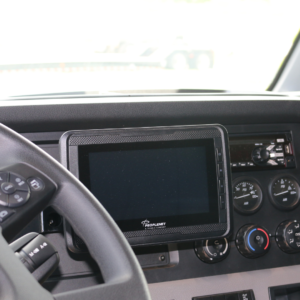An ELD is an electronic logging device that commercial drivers use to record data regarding the operation of the vehicle and driver activity. This piece of technology connects to the vehicle’s engine to automatically record hours of service, miles driven, location, and other important information. The device can then send this data to a server, which accurately logs the driver’s duty status and can be monitored by the carrier.
How does an ELD work?
The ELD communicates with the vehicle’s engine control unit. From this connection, the ELD can receive detailed engine reports, as well as real-time geographic information that can be logged and monitored. To be compliant with the ELD mandate, all devices must be registered and certified by the Federal Motor Carrier Safety Administration. Buyers are responsible for doing their own research to find a device that is verified and reliable. If carriers are using a device that is not on the registered list, they could be cited for a violation.
Who needs to use an ELD?
Drivers who submit a Record of Duty Status are required to use an ELD, so this could be considered:
- Truck drivers in the United States
- Commercial Motor Vehicle drivers
- Owner Operators
There are some exemptions for the mandate, which you can read about here.
What does an ELD log?
The purpose of this device is to make logging easier and more accurate. Here’s the vehicle information that the ELD can capture and report:
- Vehicle
- Driver identification
- User authentication
- Motor carrier
- Date
- Time
- Location
- Miles driven
- Engine hours
While the device can automatically record this information, the drivers can edit entries if needed. This information can then be viewed by managers. By reviewing this information, carriers can determine hours of service, which routes are the most costly/profitable, and which drivers might need further assistance.
What are the benefits of an ELD?
Not only are ELDs beneficial for drivers but carriers also. The greatest benefit of this device is that it improves driver safety by enforcing a more accurate log of hours of service, which can reduce driver fatigue. With the automation of accurate and detailed information, it saves time, money, and lets drivers do what they do best — driving. Here are the top benefits:
- Improves safety
- Simplifies the process of keeping records
- Increases accuracy
- Reduces paperwork
- Saves time and money
- Speeds up the vehicle inspection process
- Monitors engine malfunctions
- Reports fuel usage
- Access to data in real-time
Why is an ELD important?
First and foremost, the FMCSA has made it mandatory for most commercial drivers to use an ELD. It is much more efficient than previous recording systems like a paper logbook, an Automatic On-Board Recording Device, or a personal device. The FMCSA determined that these dated systems were inadequate, especially in regards to accuracy and safety. By enforcing better logging, it decreases the possibility of errors and allows carriers to more closely monitor hours of service. This ensures that drivers get the rest they need to be able to drive safely.
Closing Thoughts
An ELD allows drivers and carriers to stay compliant with safety regulations that make roadways safer. Not only do they increase safety, but they can also be beneficial by saving time and costs that were once associated with handwritten logbooks. An ELD is a great way to improve your fleet’s safety and compliance status.
Looking for a bulk liquid hauler who values safety and accuracy? You’ve found the one at Liquid Trucking. Liquid Trucking has been focusing its efforts on transporting liquids as safely and efficiently as possible since 1989. As a family-owned and operated business, our business has grown to now rank in the top 30 largest trucking companies in the United States. We have experience hauling food-grade products, agricultural materials, and hazmat goods for both small businesses and Fortune 500 companies. To get a quote from us, please give us a call at 844-GO-TANKS.
